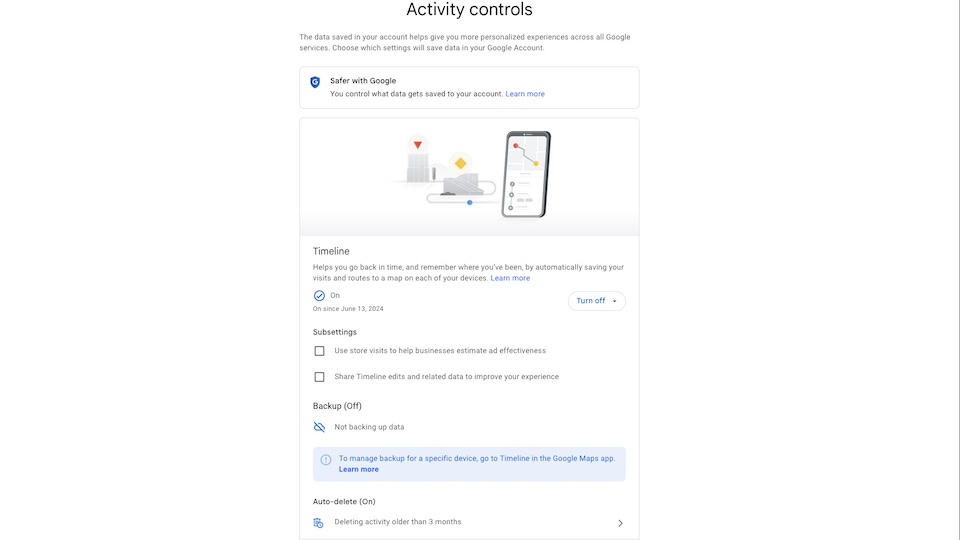Google Maps to start saving location data locally

In the future, Google will only store location data collected by its Maps app offline. Data currently saved on the company’s servers will be deleted. Civil liberties advocates have long demanded that Google take this step.
According to media reports, Google is currently alerting its users to the upcoming change. Users have until December 1 to save their current location history – after that date, the data will be deleted from Google’s servers.
Going forward, the data will only be stored locally on users’ devices. Location data will also be automatically deleted after three months by default, instead of eighteen months, as was previously the case. It will still be possible to back up data in the cloud, but according to Google such data will be automatically encrypted.
The change comes with the introduction of Google Maps’ new “Timeline” feature, formerly known as “Location History.” The feature, which users have the option to fully deactivate, saves information on what places users have visited and what routes they took to get there.
Using a test account with Google, we saw that some changes had gone into effect, while others had not. Under Settings we were advised that “When you turn on Location History, your precise device location is regularly saved – to your devices and Google’s servers.” The three-month auto-delete function was already in place, however.
Civil liberties advocates had demanded urgent implementation
Google first announced the impending changes in December 2023 – though without setting a specific date for their implementation. Users would be informed before the changes took effect for their Google accounts, the company said at the time.
Prior to the announcement, the Electronic Frontier Foundation, a civil liberties group, had urged Google to implement the changes soon. Attention in the US has focused on this issue in particular because law enforcement officials in the country frequently demand the release of location data. The EFF has repeatedly warned of the risk that this information might be abused – especially given the restrictive abortion laws in many US states.
Location history data can be used to determine what places a person has visited – and can indicate whether a person has gone to an abortion clinic.
In June 2022 the US Supreme Court revoked the nationwide right to abortion. Since then, more than 20 states have banned or restricted access to abortion.
The EFF fears that law enforcement officials in states with particularly stringent bans could use location data to prosecute those who are impacted by the restrictions.
“Cautiously optimistic”
The switch to storing location data offline will make it difficult or even impossible to obtain this information from Google, according to the EFF. Following Google’s December 2023 announcement, the EFF declared that it was “cautiously optimistic” that the change would mark the end of so-called “Geofence warrants.” A geofence warrant issued by a court allows officials to demand from Google information on all devices detected in a given geographic area within a certain period of time.
Speaking to Forbes magazine, a Google employee confirmed that the changes were being implemented in order to put a stop to these demands from law enforcement.
Geofence warrants are highly controversial: civil liberties groups like the EFF argue that they violate the 4th Amendment of the US Constitution because, unlike a normal search warrant, “they are not targeted to a particular individual or device.” As a result, hundreds of people come under police scrutiny who have no connection to the crime under investigation.
Last year, the EFF successfully challenged one such warrant in court.
According to the EFF, geofence warrants are possible because up until now Google has stored location data on its servers. In the past Google has reported that such warrants made up more than a fourth of all court-issued demands to provide data that the company receives in the US.
Jennifer Granick of the American Civil Liberties Union (ACLU) told Forbes: “The repository of everyone’s location data dating back months or years was a hazard, and Google is trying to clean up that hazard.” The changes are “a real benefit for people’s privacy,” because location data “is some of the most revealing information about us.”
Collecting location data
But other companies and apps collect location data as well. Authorities in the US for example also buy commercially available location data from data brokers. The EFF warns that it remains to be seen whether in the future the authorities will find other ways to obtain location data.
Google announcedin July 2022 its plans to automatically delete from users’ Location History any information about visits to medical facilities like abortion clinics or counseling sites. But an investigation by Accountable Tech revealed that in many cases this data continued to be saved by Google. (js)